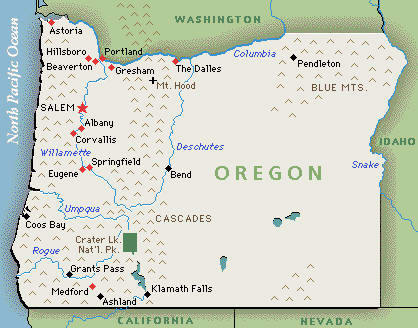 With general legalization in Oregon, the number of people enrolled in the state medical marijuana program is plummeting, and there is talk of actually ending it. Authorities have already dramatically slashed the limit for daily sales, supposedly in a crackdown on diversion to the black market—which continues to thrive, even amid the notorious over-supply.
With general legalization in Oregon, the number of people enrolled in the state medical marijuana program is plummeting, and there is talk of actually ending it. Authorities have already dramatically slashed the limit for daily sales, supposedly in a crackdown on diversion to the black market—which continues to thrive, even amid the notorious over-supply.
Patients and cannabis cultivators across Oregon are dropping out of the state's medical marijuana program—seemingly driven by both a carrot and a stick, in the old metaphor. The prior is the convenience of retail sales on the legalized "recreational" market. The latter is the high annual fee and general bureaucracy of the medical program.
Is the medical program still relevant in the age of legalization?
Eugene-based KVAL, in a report on the trend last week, actually foresses an end to the Oregon Medical Marijuana Program (OMMP). Quoted is Kit Doyle, who long sold medical marijuana but recently switched to hemp products through his business, the Murphy Hemp Company. "Medical could officially have a gravestone," Doyle said.
The number of patients registered with the OMMP is half what it was just a year ago. It has dropped 41% in the past 12 months—from 59,137 enrolled to 34,892. The number of registered growers also declined steeply—from 23,175 to 13,959.
Oregon was among the first states to legalize medical marijuana, with Beaver State residents voting it up way back in 1998. The OMMP was established by the state Legislature nine years later, to bring greater government regulation to the market and license dispensaries. But in 2014, voters approved a general cannabis legalization, allowing retail sales to anyone over 21 and establishing commercial cultivation. The 2014 initiative also allows Oregonians to grow up to four plants, with no registration requirements, except where prohibited by local law. Grants Pass is one of the few localities to have opted out of legal cultivation.
Those enrolled in the OMMP can avoid sale taxes of up to 20%—but they must pay an annual $200 application fee. KVAL reports that this appears to be a key factor in the program's decline. "I repeatedly hear from customers," said Diana Calvert of River City Retail dispensary in Merlin, which now serves both the medical and recreational market. "They say, 'I let my medical card expire. It's too expensive to renew. I'll just pay the taxes.'"
Taxation is a major issue in neighboring California, where general legalization has ironically closed space for "compassionate care." A bill that would have relieved the tax burden on medical marijuana providers was vetoed by Gov. Jerry Brown in September. But there are some critical differences between how things have unfolded in the two states. In Oregon, medical marijuana remains tax-free, while in the Golden State provisions for tax-free medical sales have been kicked down the road for years. On the other hand, in California a state card is not mandatory to participate in the medical marijuana program—so there is no annual fee.
The persistence of the black market
Despite the notorious glut of oversupply in Oregon since legalization, authorities earlier this year slashed the amount of cannabis that can be legally purchased under the medical program—supposedly, to stem the diversion of product to the black market, Marijuana Business Daily reported in August that the Oregon Liquor Control Commission (OLCC) reduced daily purchasing limits for OMMP cardholders to one ounce—down from the previous limit of 24 ounces.
The previously generous daily maximum provides some context for the egregious case of Patrick Beadle, the Oregon-based musician now facing eight years in prison in Mississippi after 2.89 pounds of cannabis was found in his car, bought legally through the OMMP. At 24 ounces a day, that is a very plausible quantity. But no more.
And—as in California—illegal cultivation and sale have paradoxically survived in the legalized system. In but the latest big bust, police confiscated 800 pounds of cannabis and 50 pounds of "marijuana concentrate" stashed in a rental truck headed south on US. Highway 97 in Deschutes County last month. It was part of a crackdown by the Central Oregon Drug Enforcement (CODE) team on unlicensed cultivation, as Bend Bulletin reports. The seized product was supposedly headed for California.
Among three arrested in the operation was local resident Shaun Gutta, who was indicted on charges of "unlawful possession, delivery and manufacture of marijuana." Hundreds more pounds were found at Gutta's property in La Pine. He had apparently told neighbors that he was cultivating medical marijuana. But neither the OMMP or OLCC had record of any active licenses for the address, according to court documents.
"Law enforcement is doing a great job of detecting and uprooting illegal activity," OLCC's Mark Pettinger told the Bend Bulletin. "We work in concert with law enforcement."
But this is hardly what Oregonians expected when they voted up legal cannabis in 2014. And lifting the bureaucratic hurdles might be a better way to de-incentivize the black market than phasing out the medical marijuana program.
Cross-post to Cannabis Now
Photo by GreenwichMeanTime







Recent comments
2 weeks 3 days ago
2 weeks 4 days ago
5 weeks 4 days ago
6 weeks 4 days ago
10 weeks 4 days ago
14 weeks 2 days ago
18 weeks 2 days ago
19 weeks 1 day ago
29 weeks 1 day ago
33 weeks 1 day ago